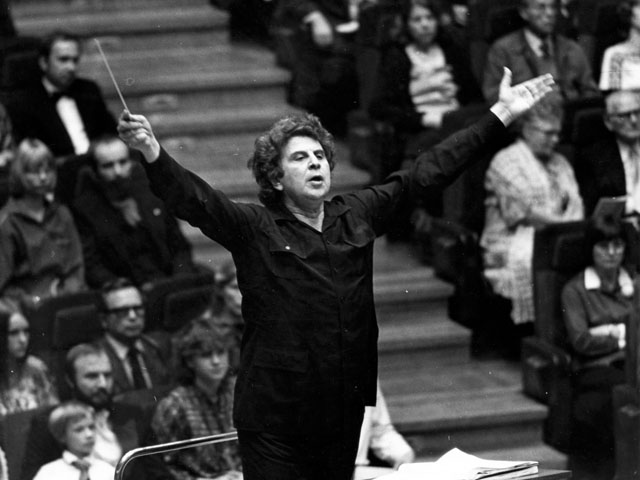Greece’s greatest composer of all times died on September 2, aged 96, an ordinary man with extraordinary talent.
At age 17, Mikis Theodorakis gave his first performance in Tripoli with his work “Kassiani”.
His works defined him as the biggest national composer of all times for Greece.
His music touched generations of Greeks at home and abroad.
He made history when he composed Zorba the Greek (1964), a cinematic work based on the famous novel of Nicos Kazantzakis that starred Anthony Quinn.
Among the most famous of his works include Axion Esti, a collection of poems by Odysseas Elytis, awarded the Nobel Prize in literature in 1979.
Theodorakis gave life to them with his music and made them accessible to ordinary people.
Elytis, who took part in the campaign and witnessed first-hand the carnage and suffering of the war, saw his work as a testament to the Greek soldiers’ struggle in the Albanian front against Mussolini’s fascist forces that attempted to invade Greece on October 28, 1940.
His work also glorified the epic struggle of women who suffered immense hardship to carry supplies to the front and young men falling dead in the bitter snow away from their homes in defence of the nation.
Greece was the first allied country to defeat an axis power and enrage Hitler.
The Germans took matters into their own hands in April 1941 after repeated failures of Mussolini’s forces.
They encountered bitter resistance forcing Goebbels to explain to the German public the Wehrmacht was fighting the descendants of Leonidas, the king commander who made history during the Persian wars by defending Thermopylae with just 300 hundred men against tens of thousands of enemy troops.
The victory of the Greek army on the Albanian front came to define Greece as a nation of freedom, democracy, and the unyielding resolve to defend the nation.
Theodorakis lived through that war and ensured generations would remember the sacrifices of the Greek people through his music and Elytis’ words.
The famous singer Marinela performed many songs on that album, including Women from Epirus and the Reservist.
Born on the small island of Chios on July 29, 1925, Michael (Mikis) Theodorakis quickly demonstrated his musical talent after taking violin classes in 1937.
His father was a high-ranking public servant from Crete, and his mother was from Asia Minor.
Theodorakis wanted to write music more than anything.
But he was also a patriot and had a burning desire to see his country free from foreign oppression.
Arrested and tortured
During the occupation of Greece by Nazi Germany, Theodorakis risked his life along with others, and he was arrested during the big demonstration of March 25, 1943.
The Italians tortured him, still allies of the Germans at the time.
He later escaped, and the same year, he began studying music at the Athens Conservatory where he was acquainted with contemporary and Byzantine music.
During the last year of Nazi occupation, in 1944, he took part in the resistance against the Germans in Athens.
He also took part in the December revolt against the British puppet government in Athens that came to be known as Dekembriana.
Because of his political activities, he was arrested by the regime and sent to the island of Ikaria in 1947 and later Makronisos until his release in 1949.
He managed to complete his studies at the Athens Conservatory and later left for Paris to further his education in music.
He was acquainted with different musical styles and made new contacts.
Despite the hardship during his detention, he managed to compose music.
When the military Junta took power in 1967, Theodorakis was a well-documented communist or a left-winger.
He was soon arrested by the regime who forbade the sale or broadcast of his music.
During that time, he was imprisoned and even tortured.
As his health deteriorated while he was detained at the Oropos political prisoner camp, many Greeks and foreigners protested abroad for his release.
Among them were composer Dmitry Shostakovich, playwright Arthur Miller, and actors Laurence Olivier and Yves Montand, who set up an international committee demanding his release.
Under incredible international pressure, the dictators backed down and allowed him to leave the country on April 13, 1970.
Once again, Theodorakis became a symbol of freedom and democracy through his political activism while composing music.
Emotions
Soon after the fall of the Junta, he returned to Athens in October 1974 and performed two historic concerts at Karaiskakio stadium in Athens, where his music electrified ordinary people.
Even Theodorakis found it hard to contain his emotions and conducted the orchestra in a spirited atmosphere.
The great Gregoris Pithikotsis sang many of his songs, as did the legendary Maria Farantouri.
Both concerts were an emotional outburst of the oppressed Greeks who also had to come to terms with the humiliating military defeat following the Turkish invasion of Cyprus due to the Junta’s failed attempt to overthrow Makarios.
The crowd hailed Theodorakis as a symbol of democracy for a nation longing for human rights and dignity.
Antonis Kalogiannis performed ‘Ena to helidoni’, and the crowd went ballistic, singing along and cheering Theodorakis as he was conducting the orchestra.
Theodorakis’s political orientation was undoubtedly toward the left, but he was above all a true patriot with an acute sense for democracy, peace, and human rights.
Although he spent decades supporting the left, he found the courage in the 90s to side with the New Democracy right-wing party under Constantine Mitsotakis, the father of the incumbent Greek prime minister.
He joined the party as an independent and was elected to parliament.
He even served in the cabinet.
His political decision was a patriotic one as he sought to help revive Greece after years of economic mismanagement and corruption by the socialists Pasok under Andreas Papandreou.
Prime Minister Kyriakos Mitsotakis announced a three-day national mourning for the death of Theodorakis.
The composer’s last wish was to be buried in his ancestral homeland of Galatas, west of the Cretan city of Chania, something which will be fulfilled.
Michael S. Olympios is an economist, business advisor, Editorial Consultant to the Financial Mirror










